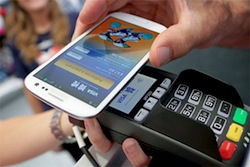Host Card Emulation (HCE) could be the key to unlocking the “struggling” NFC market, analysts have claimed, as they predicted the value of global payments through mobile devices will hit €368 billion this year.
Juniper Research said progress in the contactless m-payments market has been slow, with banks left unconvinced about their value. Operators have filled the gap, with Orange recently launching an NFC m-payments service in France and four Russian networks working together on an NFC project. However, O2 stepped back from its wallet service in the UK, with the promise to relaunch it at a later date.
Analyst Windsor Holden said the payments space looked healthier in the medium term, with the emergence of HCE software, which approves payments in the cloud rather than on a secure element on a handset. Google added HCE compatibility for its most recent version of the Android OS and both Visa and Mastercard announced HCE functions at Mobile World Congress.
[Read more: HCE, NFC and security dominate m-payments debate]
Holden commented: “The prevalent business models for NFC have been unattractive to banks and left them dependent on multiple network operators, each of which may have its own approach to mobile wallet management. HCE solutions have the potential to revitalise a market which has struggled to gain traction.”
Holden added that another development that could boost the market is how the majority of point of sale terminals are shipping with contactless payment functionality.
Juniper’s report found the wider value of payments made on a mobile device was surging, with average basket spends via tablets already overtaking those made on desktop PCs. Smartphone spend was also increasing sharply. One particular area of growth was in mobile ticketing, where a range of new apps from transit authorities in Europe and North America were subject to heavy demand from consumers.
Read more
British banks launch Paym payments service



